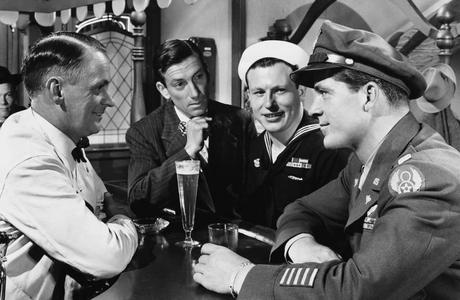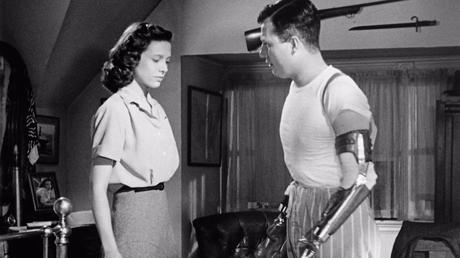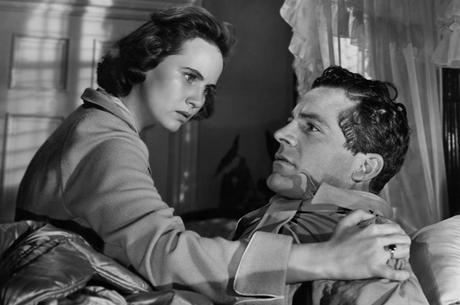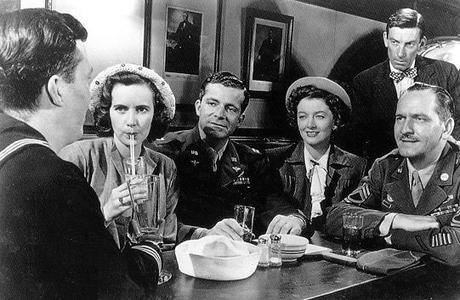Retro Review: 'The Best Years of Our Lives'
When it comes to war being portrayed cinematically we have no shortage of movies which show the glory and heartache of combat. However, what happens when the guns go silent and the men go home (remember there used to be a time when wars actually ended)? Inevitably, those who went through Hell will not be the same and adjusting to a normal life could be the hardest battle of all. During the Second World War, legendary director left Hollywood and took his filmmaking talents to the frontlines. No doubt, being around these soldiers inspired him to make a movie about their lives. When he came home, Wyler made a 1946 film the Best Years of Our Lives to look at what soldiers do when they have to put it all behind them and come home. The result was one of the greatest pieces of American cinema considered one of the rare "perfect movies".

World War II has come to an end and it is time for the triumphant soldiers to come home. In the case of Al, Fred and Homer, this means returning to their small hometown in the American heartland. Forming a close bond on the flight home, they each have visions of peaceful and prosperous lives, only they learn things can never go back to how they were before. Treated like fragile glass by his family, Homer retreats into a dark place away from everyone, even the love of his life Wilma. Al returns to his loving wife Millie and daughter Peggy, as well as a major job promotion at his bank. But his struggles to cope with the new normal drives him to relying on alcohol. When Fred left home he was a soda jerk at the local pharmacy, but after a successful stint as a bomb commander, he figures things are about to turn around career-wise. But after being told frequently "war is over" he ends up right back where he was with all the mental anguish it entails, to go along with a loveless marriage. Complicating matters is a growing closeness between Fred and Al's daughter Peggy which drives a wedge between the two friends. What follows is an emotional roller coaster, as these three men try to figure out a way forward.

The reason why this movie has stood the test of time for seven decades is the fact that it took a grounded and realistic look at universal issues which still plague our society. Simply fighting off the enemy is no longer the answer; the three men of this movie now have to fight their own mental and emotional battles. What Wyler does which is so genius is that he refuses to beat his audience over the head with any of it, rather he lets everything unfold naturally and realistically. There is no strong exposition concerning Fred's nightmare-inducing PTSD. We are shown his struggle and along the way piece together that he lost the crew under his command on a bombing run. While hailed as a hero for completing the mission, Fred is plagued by his survivor's guilt. Like so many other issues in the wake of WW2, Wyler put it in the film matter-of-factly allowing the audience to draw their own emotional conclusions. Topics of: race, poverty, joblessness among vets, and more are portrayed exactly how they are in the real world. It takes most people multiple viewings to notice things like; the highest-ranked of the three characters is the lowest on the socio-economic ladder. Or that the African-American man treated like crap by the rich guy at the beginning has his own military insignia meaning his reward for fighting is returning home to this kind of treatment.

One of the most memorable elements of this film is the ensemble of some of the finest actors of all-time. Myrna Loy, Frederic March, Dana Andrews, Hoagy Carmichael, and Teresa Wright all turn in some of the best performances of their storied careers. But it non-actor Harold Russell who memorably steals every scene he is in. Russell was an actual veteran who lost both hands during World War II and once William Wyler learned his story, he knew this man had to be in the movie. With his portrayal of Homer, he puts a human face on those physically changed by the war. His character arc is one which grabs you by the heart and refuses to let go. When we initially meet him, Homer is a carefree young man, sure where his hands once were are now hooks, but he has gotten very good at maneuvering them and has a brash self-confidence as he is eager to reunite with his fiancée Wilma. It is when he gets home to his family and experiences how those he loved before treat him differently now which drives him into a spiral of depression. Slowly but surely he drives; his parents, his sister and even Wilma away as he now sees himself as a helpless and broken shell of his former self. But what he does not count on is the fact that Wilma will never leave his side, and she makes this abundantly clear in a scene that reduces the most hardened moviegoers to tears. Russell's performance naturally warranted an Oscar nomination, but fearing he would lose to the actual actors he was competing against, the veteran was awarded a special Oscar. But in a Hollywood-perfect twist, Harold Russell actually did win Best Supporting Actor, taking home two trophies for a single performance. Not so lucky on award night, was his co-star Myrna Loy who's lack of nomination has long been pointed out as one of the all-time biggest Oscar snubs. As Millie, Loy delivered a rich and multi-layered performance as a woman trying to keep up the appearances of your standard Post-War housewife. Despite outward appearances, Millie is tearing herself up worrying about her husband's increasing alcoholism and whether or not he still loves her the same as he did.

In the silent film classic, the Unholy Three, had the famous line "that's all there is to life. Just a little laugh, just a little tear". I can think of no better way to describe the Best Years of Our Lives, this is a masterpiece which takes the viewer on an emotional train ride through heartbreak and triumph. While World War II was the topic of countless films during this time, the movie captures what life was like after the war when the battlefield for many became an internal one. While the emerging film noir movement often tackles this same topic, the Best Years of Our Lives did so without the bleak cynicism. Instead there is a hopefulness in this picture, true none of their issues are magically resolved, but we get the feeling that there is a light at the end of the tunnel. The film has truly earned it's place among the all-time greats and should be viewed by everyone.

